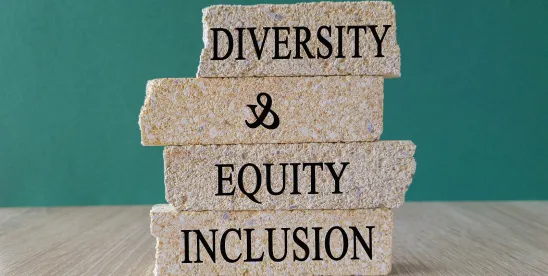Update as of April 4, 2025: Chicago Women in Trades (CWIT) is a non-profit, federally funded organization dedicated to “promoting diversity, equity, and inclusion within the skilled trades industry.” After receiving notices from the Department of Labor to cease all activities related to “diversity, equity, and inclusion” or “diversity, equity, inclusion, and accessibility” (together, DEI) programs, and a notice that all CWIT grants and contracts were being terminated, CWIT filed suit. The United States District Court for the Northern District of Illinois recently published a Memorandum Opinion and Order, enjoining the Department of Labor from: (1) requiring any grantee or contractor nationwide to make any certification or representation pursuant to the Certification Provision of Executive Order 14173; (2) terminating or freezing awards and contracts with CWIT; and (3) initiating any False Claims Act action against CWIT pursuant to the Certification Provision of this Executive Order. Unlike the injunction issued by the United States District Court for the District of Maryland and overturned by a panel of the 4th Circuit Court of Appeals, the injunction pertaining to the Certification Provision applied only to the Department of Labor and, with respect to the Termination Provision and the Enforcement Provision, only as to CWIT. We expect further litigation and will continue to monitor developments.
In the first two months of President Trump’s second term, his administration has sought to redefine “illegal” diversity, equity, and inclusion (“DEI”) and diversity, equity, inclusion, and accessibility (“DEIA”) programs.
As described in our client alert of January 22, the Trump Administration issued a January 21, 2025 executive order titled “Ending Illegal Discrimination and Restoring Merit-Based Opportunity” (“EO 14173”). Since then, the Attorney General issued a memo titled “Ending Illegal DEI and DEIA Discrimination and Preferences”, the Office of Personnel Management issued a memo titled “Further Guidance Regarding Ending DEIA Offices, Programs and Initiatives, and the Equal Employment Opportunity Commission and Department of Justice jointly issued technical guidance titled “What You Should Know About DEI-Related Discrimination at Work”.
Executive orders are directives to federal agencies and officials that must be followed by those agencies. Although they are not binding on those outside the government without legislative action, the manner in which they are implemented has direct implications for federal contractors and grantees. Nevertheless, private employers will be directly impacted, as the executive orders direct each federal agency to identify up to nine of the “most egregious and discriminatory DEI practitioners” for potential civil compliance investigations. The AG memo takes it further, by asking agencies to also identify private employers for criminal investigation.
But what is an “illegal” DEI program? The EEOC technical guidance begins by stating that “DEI is a broad term that is not defined under” existing law. To date, at least two federal District Courts and one panel of a Court of Appeals have criticized the lack of definition of DEI and related terms. For example, on March 27, the United States District Court for the Eastern District of Illinois, Northern Division, enjoined implementation of the executive order, stating that “the Order provides no definition or even an example of what is considered ‘illegal DEI’ that would be permissibly terminated, and the government has been unwilling or unable to clear it up during this litigation Despite the lack of clarity, however, the law relating to DEI programs has not changed—if a DEI program was lawful under federal antidiscrimination laws on January 19, 2025, it remains lawful today.
Nevertheless, the lack of clarity, paired with the clear language this administration has used to reference DEI programs in general (for example the executive order describes DEI as “dangerous, demeaning, and immoral”), has caused confusion and uncertainty within organizations, leading some to eliminate DEI programs and/or scrub their websites of all references to DEI programs. Doing so, however, could subject an employer to employee backlash, including claims of discrimination, as well as public calls for boycott.
Before deciding whether to eliminate, maintain, or enhance your diversity and inclusion programs, we recommend the following:
- Understand the laws in your state. Although this administration has signaled it expects compliance with its directives regardless of state law, the states may not agree.
- Document the lawful purpose behind diversity and inclusion programs.
- Document employment decisions carefully, setting forth the business reasons behind the decisions and demonstrating that decisions are based on merit without regard to any protected characteristics.
- Review your diversity and inclusion policies, programs, and training materials, including all public-facing DEI-related communications and disclosures. Consider whether to conduct this review under the umbrella of attorney-client privilege.
- Review your investigation protocols, to encompass complaints and concerns about DEI programs and “DEI-related discrimination.”
- Develop internal and external communications strategies, to mitigate legal risks while staying true to your culture and values.
- Closely monitor legal developments.
Some DEI programs may contain elements that could be challenged under the law that existed on January 19, 2025, before President Trump’s second term began. Consider immediately eliminating those elements, which may include the following,
- Employee resource groups that are only open or provide benefits to employees based on specific protected characteristics.
- Scholarship, fellowship, internship, mentoring, and other professional development opportunities that are limited to or targeted at members of specific protected characteristics.
- Goals, targets, or quotas based on protected characteristics.
- Compensation targets based on the achievement of DEI objectives or goals




 />i
/>i

